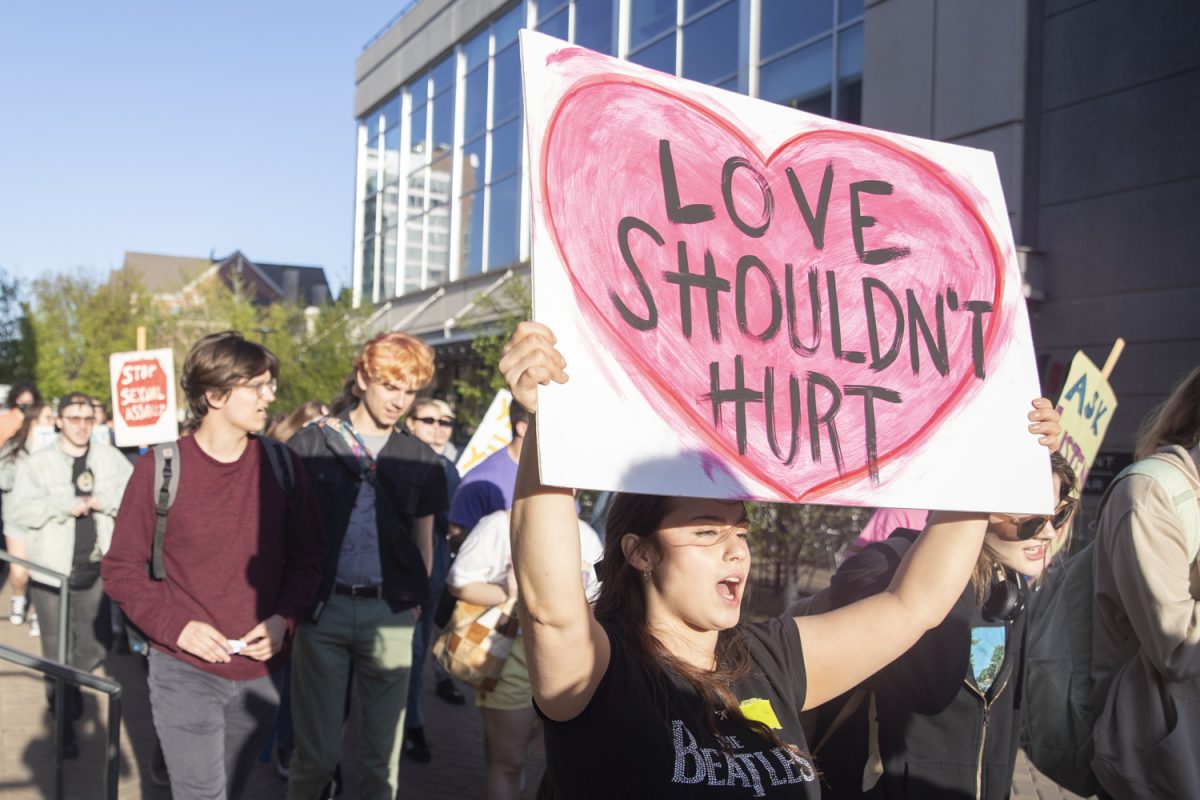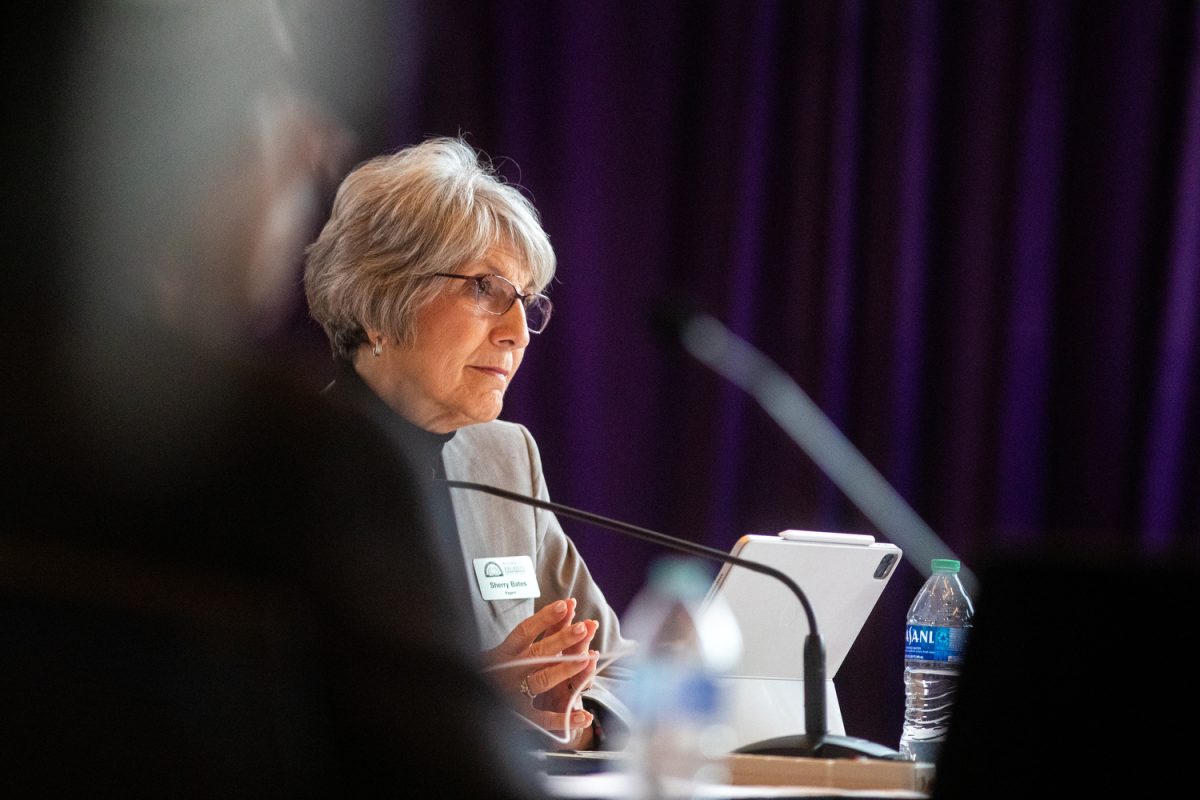The Daily Iowan: What are your thoughts on the tuition freeze?
President Mason: Let me say a couple things about tuition and let me start with tuition generally. The Board of Regents sets tuition. Obviously we do that on an annual basis, and obviously we look at a lot of different factors before we come to any conclusions about what tuition should be for the following years. I would tell you that over the last three years, during the worst of the budget crisis and the flood, I think we’ve done a pretty darn good job of keeping tuition increases low especially in the face of massive declines in state appropriations. We lost 65 million dollars in less than two years in state appropriations. We did not try to make up that amount of money by tuition increases. Instead what we did was we designed a strategic plan that was very specifically focused on student success, and we said, okay, we will create efficiencies saving millions and millions of dollars on the administrative side, on the sustainability side. We’ve been sharing these with legislators. We created efficiencies so we could deal with the budget cuts and we said any new money we get — whether it’s through a tuition increase or whether now, since we’ve asked for state appropriations — would go directly to support student success initiatives, so all the tile classrooms that we’ve built – good example of how we’ve used tuition dollars and how we’ve used other moneys to make sure that students are getting the kind of quality information. We don’t want students coming away from the University of Iowa feeling that they somehow — because of the budget cuts — are getting shortchanged — because you’re paying more than the state is for your education — and we want you to realize what a great value you’re getting for the money you’re paying. Our tuition is low by any measure. If you look at other Big Ten schools, if you look at other schools like us, you’re going to see that we’ll always be at the bottom of the pile in state tuition. That’s intentional and I know the Board of Regents and I am just wanting to keep it low. That’s our goal: To keep that tuition low so that it’s affordable so that Iowa kids in particular aren’t going to feel like they can’t come to the University of Iowa because they can’t afford it. It’s unfortunate that, in general, the public and, certainly legislators, are feeling like higher education is less of a public good and more of a private good. In other words students pay more for it because legislators have walked away from the responsibility of funding it. The arguments that we’re inefficient or that we’re not spending the money, while they may have been valid at one point in time, I don’t think that’s true anymore. I do not believe that we are spending the dollars poorly. I think we’re investing them well because we’re investing them primarily in what our students need the most.
DI: If the tuition freeze does pass into law is the UI going to have to reevaluate the programs they feel are most important for students?
Mason: Oh, absolutely. We do that on a regular basis, too. We try new programs all the time, Some of them work some of them don’t work, we’ll jettison those after a short period of time because we don’t have the kinds of resources to spend to see how long it’s going to take to make this work. Not every program that we try for students is highly successful. That On Iowa! program that was a great experiment that we tried last year, I think that was highly successful and I think we’re going to continue to expand it. That’s where some of the tuition dollars are going now, to make sure that programs like that that will help us with retention – that help us get students off to a great start, so they feel connected to the university, and so they’ll stay connected to the university and finish their degree here. I think that’s the way we’re making our investments now, and that’s the way we’ll be making our investments in the future, and if it doesn’t work we’re not going to spend years and years trying to make it work. We’re going to move on.
DI: What are the ways you evaluate whether programs like that work?
Mason: You ask the students. What did you like about this? It’s going to take a couple before we know whether ON IOWA has the effect on retention that we think it will. That’s another tool that we put in place to continue to improve our freshman-sophomore retention, and those numbers have been going up and that’s where we continue to make investments because we’re getting positive reinforcement there. The more we do in that area like this, the more students we’re keeping and that’s the goal. How do we know?
DI: What are your thoughts on having the first female dean for the Tippie School of Business?
Mason: I’m thrilled that we found a highly, highly accomplished and qualified candidate who happens to be a woman to lead the Tippie college of business. Delighted. I had the privilege of interviewing all of the candidates for that position and I felt we had a very strong pool of candidates. I was delighted when the search committee and the provost and the faculty felt that Sarah was their candidate and I was even more thrilled when the provost told me she accepted our offer. It’s a good feeling when you go through a national search process and you all come away feeling like you got the exact person that you wanted for the job. She came and she impressed everyone, she certainly impressed me. I think she’s going to do an outstanding job for the Tippie College of Business. I’m excited about it. She’s got the right kind of academic experience, she’s got the right kind of administrative experience, so everything’s lined up for good things in the future. It’s exciting to be the first woman doing something.
DI: Do you feel like the University of Iowa is a career destination and a goal, or a stepping stone to something bigger?
Mason: It’s both, and it should be both. It should be a destination and in some cases the dean’s position is a culmination of a career for lots of people, and business deans, and oftentimes that dean’s position is the culmination. Oftentimes they may go on to do something else in the business world or they may go on to lead a university because of the experience they’ve had both as a business dean and obviously academic experience too. There’s all kinds of possibilities there. You never know what’s going to happen. When you have a highly ranked college like the Tippie college is, it’s a destination. People look at it and say that for me would be a wonderful career move. If it ends up being their last career move, so be it. If it ends up being an opportunity to look at other opportunities down the road that may be even better then that’s a great thing too because it speaks well of Iowa as that training ground.
DI: Are there any negative effects on the workflow within a school when one dean moves and another comes in?
Mason: Only if there were problems to begin with. Only if there were issues. The great thing about the transition we’re making here is Curt Hunter did an absolutely marvelous job. In fact, he gave a presentation this morning that summarized where the college is. The rankings are strong, the student numbers have doubled in his six years here. All kinds of good things have happened. They’ve grown their international programs, everything is in great shape, and now he’s ready to transition that to the next dean. Sarah’s coming in. Given the strength of her administrative and academic experience, we shouldn’t skip a beat. The big questions for her are going to be, we’ve got a strategic plan in place, do we want to tweak it? What are the kinds of things — once she’s here for a while and she learns what the possibilities are — that she wants to do to leave her own mark on the college? In that sense, this was a wonderful time for a transition, and I think she’s stepping into a very fine situation. Of course, I felt that way when I came to the university of Iowa and then we had a flood.
DI: So, I understand that the Board of Regents is doing some marketing for the state schools through their road shows. Do you plan on getting involved in that?
Mason: That has been largely led by our students, and I’m so proud of them because they’re working so hard and so well together. I told them, if you want me to be involved, if you have something specific you want me to do tell me, I’ll help out, but I really like the idea that they are on the road. In fact, I saw the bus loading up this morning and headed to Des Moines. I think it’s terrific, and I’m so proud of them.
DI: What are your thoughts on the flood recovery process that’s underway, and how did you feel about the information that was presented last week?
Mason: It was really great to have reps from the architectural firms and each project has two sets of architects. It has an in state set of architects and an out of state set of architects and to have representatives there to present the projects, it really felt like finally after four years we’re at this good point where we can get these projects started and the Board was so enthusiastic on its approval and they were so engaged by the tour, the Cambus tour we took, I think it was a really good opportunity to show them very directly what these projects mean to us: where they’re going to be, what they’re going to look like, and how much they’re going to do for campus vitality. And the school of art and the school of music projects are so important to our students and faculty and staff. They have been so disadvantaged now for the last four years although we’ve managed I think to once again hide it well. The students out at Menard’s have enjoyed having lots of space out there to do their work, but now they have this fabulous new facility. I think the school of music has been even more disadvantaged because they’re still in seven different locations all around town, and that’s hard. It’s hard to manage a program that has been over the years so cohesive because ultimately the goal of producing music whether it’s song, whether it’s musical instruments, symphony, small groups it’s just been very difficult for them. It just feels great to have these projects now on their way.
DI: Do you feel like the money is being allocated efficiently?
Mason: As much as we can. We work with FEMA. You can argue whether heating old Hancher is an efficient use of money and resources, but it’s a FEMA rule, so we have to work very closely with FEMA. We have to follow their rules. It’s a process.
DI: How do you feel about having a University of Iowa wrestler participating in the Olympic trials?
Mason: Since I was little I’ve been, what I might describe as, an Olympic junkie. Whether it’s the summer Olympics or the winter Olympics, I look forward to when they come around – especially the summer Olympics because I tend to have a little more time. I end up glued to the television set, and I’ll spend evenings watching whatever events I can cram into an evening. I can remember watching the Brands’ boys win their medals at the Olympics a long time ago now, and I’m really looking forward to being able to host here in Iowa City the Olympic wrestling trials. We’re better than a place with a history and traditions that we have in wrestling to have Olympic trials right here, so it’s exciting. I’ll be looking forward to seeing some Hawkeyes. Now I have even more of a reason to be engaged in the Olympic wrestling trials because there’ll be lots of Hawkeyes and people with Hawkeye connections that will be participating and competing and I wish Matt McDonough all the best. I think he’s got a great shot at one of those medals, and someday he might be coaching Iowa wrestling. Who knows?






